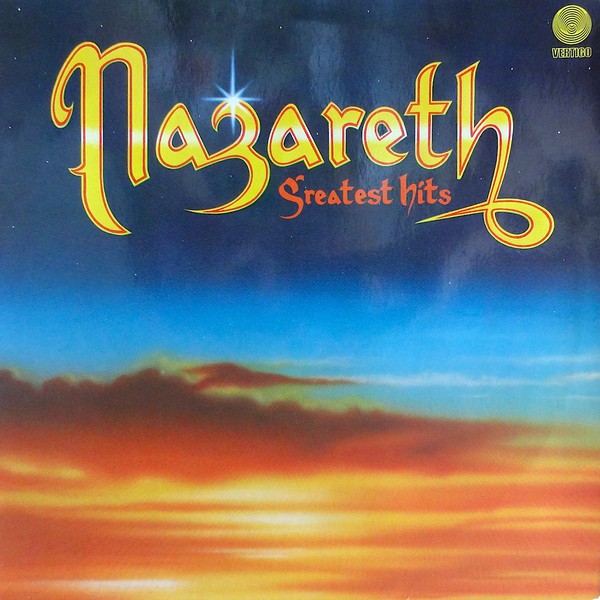Every now and then a compilation comes along which effectively becomes the definitive release by the act in question. Kirsty MacColl’s Galore is an obvious one, The Free Story is another, and it turns out that Nazareth Greatest Hits is another. In fact, Nazareth Greatest Hits is considered so definitive a release that it is one of the few compilations that has seen regular remastering and reissues instead of just being superseded by more recent compilations. Not that Nazareth isn’t well represented by plenty of alternative compilations (indeed, there are close to five dozen), but few Nazareth fans would dispute that this Greatest Hits set is probably their best.
One of the keys to this compilation’s success is its brevity. At under 45 minutes it tells you everything you need to know about Nazareth at the height of their commercial success in a svelte dozen tracks. While Nazarethdid continue to enjoy a solid amount of commercial success well into the early 80s, in truth ’73 to ’75 was Nazareth’s zenith, with only the closing “Woke Up This Morning” pre-dating this period on Greatest Hits.
Even at just twelve tracks, Nazareth Greatest Hits covers quite a bit of ground, from the opening party boogie rock “Razamanaz”, the singalong “Shanghai’d in Shanghai” and “Broken Down Angel”, to a proto-power-ballad version of The Everly Brothers’ “Love Hurts”, which sounds for all the world like a blueprint for a slower Bon Jovi number, something underlined by the semi-acoustic “Sunshine”. Perhaps best known of all Nazareth numbers though is “Hair of the Dog”, which competes with Blue Oyster Cult’s “(Don’t Fear) the Reaper” for the most judicious use of a cow bell on a hard rock song, and is rightly hailed as an undisputed rock classic.
Okay, so you have the diversity of sound, and the fact that it’s an economical and efficient rounding up of Nazareth’s most successful period. There’s also another x-factor to what makes Nazareth Greatest Hits work so well, and that’s that the songs themselves don’t fall into the trap that so much classic rock of the 70s were victim to. They simply aren’t dragged out any further than they need to be. Only one song on this collection reaches four minutes, and then only just. It seems Nazareth had struck upon a formula which meant that they got to the point in a song without any sodding about, a distinctly Scottish approach.
For me the one shame about Nazareth Greatest Hits, is that it was released too early to include my personal favourite Nazareth number, “Telegram” from 1976’s Close Enough for Rock’n’Roll. That said, it would have stood out like a sore thumb among the original dozen tracks, as it’s double the length of the majority of the other songs, and is a multi-part tune which flirts with progressive rock. “Telegram” did actually make it on to the 2010 Salvo ecords reissue of Nazareth Greatest Hits, along with eight other bonus tracks which post-date the original release of this compilation album, and obviously doesn’t have the original’s appealing brevity.
Although not always identified as such, Nazareth Greatest Hits should be used as a strong case study in how to do a compilation right. It presents the breadth of the band’s best material, it doesn’t just concentrate on self-penned songs, with “Love Hurts”, “This Flight Tonight” and “My White Bicycle” all being great cover versions, and it makes the best case for the band’s output to be reassessed and embraced as some of the best hard rock of the classic rock era.
Should Nazareth be mentioned in the same breath as luminaries like Black Sabbath, Deep Purple and Led Zeppelin? Perhaps not, but Nazareth Greatest Hits make a pretty solid case for it.














No Comment